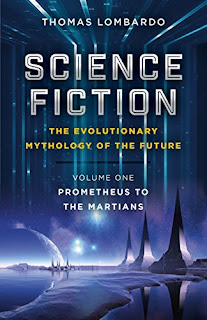Congratulations to the recently announced Hugo Award nominees for the best in science fiction and fantasy for 2022! To be awarded at Chicon 8, the 80th World Science Fiction Convention, which will be held in Chicago, at the beginning of September.
Nominees for this year's Best Novel include
A Desolation Called Peace, by Arkady Martine,
The Galaxy and the Ground Within, by Becky Chambers,
Light from Uncommon Stars, by Ryka Aoki,
A Master of Djinn, by Djeli Clark,
Project Hail Mary, by Andy Weir,
She Who Became the Sun, by Shelley Parker-Chan.
Amid controversy over whether to impose absolute-zero-tolerance over matters of incantatory symbolism, the annual Nebula Awards were issued. Here is the list of the 2021 winners, with Best Novel going to A Master of Djinn by P. Djeli Clark, and Best Novela to And What We Can Offer You Tonight by Premee Mohammed, and Best Short Story to Where Oaken Hearts Do Gather by Sarah Pinker. Congratulations to all!
== Pertinent for our times - SF ==
He envisioned a nightmarish, dystopian Russia. Now he fears living in one. This New York Times article highlights the literary works of Vladimir Sorokin, who says, "A Russian writer has two options: Either you are afraid, or you write. I write."
I have long promoted Sorokin's 2011 near-future novel, Day of the Oprichnik.
BTW... Offered without comment but highly apropos: "Putin’s Demise" is one of the song titles (I kid you not) in the film score to the Hunt for Red October. Note the date.
== Seeing the world from different (and non-human) perspectives ==
Bringing aliens to life ... here's an interesting list of novels both old and new, that really put the ‘xeno’ in xeno fiction! From Watership Down to my own Startide Rising as well as Brunner's The Crucible of Time, and Matt Haig's The Humans. Should also include the spiders in Tchikovsky's Children of Time.
A fun list of “20 Must-Read Space Opera Books,” with books by Leckie, Delaney, Chambers, Banks, Scalzi, as well as E.E. "Doc" Smith and James S.A. Corey. I have never read Feintuch, Elliot, or de Pierres. And given the quality of all the others on this list, I really should! Opinions welcome, in comments!
This rumination in Salon by Kyle Galendez about “Why can't sci-fi and fantasy imagine alternatives to capitalism or feudalism?” tries really hard… and is most-cogent when discussing Ursula LeGuin’s The Dispossessed and the feudal fetishisms of Game of Thrones.
Never knew about this site that compiles the The Best Writing Contests of 2022. Some interesting ones that you might consider entering!
Any obscure pedants out there who might ‘get' why - if I were invited to contribute a story to “New Tales From The White Hart” - I might offer one called “The PlanetAgent”? Obscure!
== apropos of not much... ==
“Is there something in the water?” 20 years ago a gala was held to celebrate how many successful science fiction authors graduated or attended or taught at UCSD. So, here is the link to the video from 2002, featuring Kim Stanley Robinson, Vernor Vinge, David Brin and Gregory Benford.
Apropos of absolutely nothing at all… Oh, did you ever see a young William Shatner's entire movie spoken in Esperanto? Take a look at: "Incubus.' The music is eerily Trekky!
Fan Filk! "There's a Star Tide Rising..."
A fascinating mini-biography on SF author and cyberpunk co-founder and Portland acid-punk rocker John Shirley. Creative fellow who was 'there'! Woof. I almost wish I had taken more advantage of opportunities to crush neurons, as so many contemporaries did. Instead... Caltech? Eep. Yet no regrets. Looking at those contemporaries (the ruggedly handsome survivors) now.
"Whether you are a science fiction scholar, futurist, or enthusiast, Tom Lombardo's Evolution of Science Fiction webinar series will open your mind and expand your knowledge of science fiction. Comprehensive in scope and in-depth in its coverage, the series begins with the ancient mythological origins of science fiction and examines cultural, philosophical, and scientific dimensions of science fiction up to the present.
Based on Lombardo's multi-volume history of science fiction — Science Fiction: The Evolutionary Mythology of the Future — the series covers key authors and published works, science fiction cinema and art, and social features of science fiction.
== Resources! ==
Oh heck. While we're discussing scifi, here are some added resources for research in useful science fiction:
- Science Fiction Research Association: http://www.sfra.org/
- SFE: SF Encyclopedia: https://sf-encyclopedia.com/
- The Internet Speculative Fiction Database: http://www.isfdb.org/
- The Science Fiction and Fantasy Research Database (tamu.edu): https://sffrd.library.tamu.edu/site/
- J Wayne and Elsie M Gunn Center for the Study of Science Fiction: http://www.sfcenter.ku.edu/
- Inventions and Ideas from Science Fiction Books and Movies at Technovelgy.com: http://technovelgy.com/
- Science Fiction - TV Tropes: https://tvtropes.org/pmwiki/pmwiki.php/Main/ScienceFiction
- Science Fiction & Fantasy Stack Exchange: https://scifi.stackexchange.com/
(Newest 'story-identification' Questions): https://scifi.stackexchange.com/questions/tagged/story-identification
- Worldbuilding Stack Exchange: https://worldbuilding.stackexchange.com/




